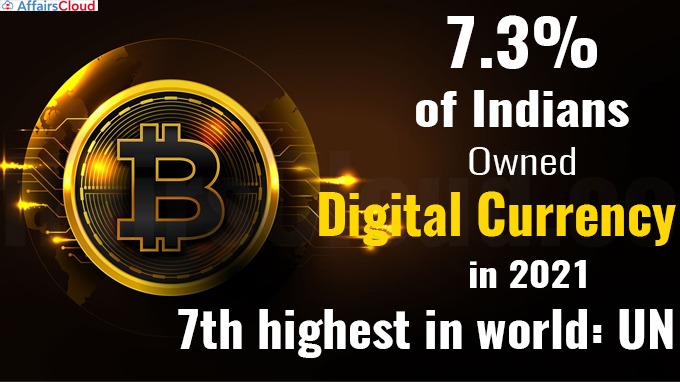 The United Nations Conference on Trade and Development (UNCTAD) estimated that 7.3% of the Indian population possessed digital currency in 2021, placing India 7th out of the top 20 global economies for digital currency ownership as a share of population.
The United Nations Conference on Trade and Development (UNCTAD) estimated that 7.3% of the Indian population possessed digital currency in 2021, placing India 7th out of the top 20 global economies for digital currency ownership as a share of population.
- According to UNCTAD, the use of cryptocurrencies escalated at an unprecedented global rate during the COVID-19 pandemic.
It has issued three policy briefs in this regard. They are as follows:
i. Policy Brief No. 100 –“All that glitters is not gold: The high cost of leaving cryptocurrencies unregulated”
ii.Policy Brief No. 101–“Public payment systems in the digital era: Responding to the financial stability and security-related risks of cryptocurrencies”
iii. Policy Brief No. 102 – “The cost of doing too little too late: How cryptocurrencies can undermine domestic resource mobilization in developing countries”
In these three policy briefs, UNCTAD stated that although these private digital currencies have benefited some people and made remittances easier, they are an unstable financial asset that can also pose societal risks and costs.
An Overview of UNCTAD’s Policy Brief No.100 – “All that glitters is not gold: The high cost of leaving cryptocurrencies unregulated”
This policy brief estimated that in 2021, developing nations accounted for 15 of the top 20 economies in terms of the share of the population that owned cryptocurrencies.
- With 12.7%, Ukraine came in first, followed by Russia (11.9%), Venezuela (10.3%), Singapore (9.4%), Kenya (8.5%), and the United States (8.3%).
Between September 2019 and June 2021, the cryptocurrency ecosystem grew by 2,300%, especially in developing countries.
- This came with significant risks and consequences for national monetary sovereignty, policy options, and macroeconomic stability.
Risks Associated with Cryptocurrencies
i. The monetary sovereignty of nations may be at risk if cryptocurrencies becomes a widespread means of payment and even unofficially replace national currencies (a process known as cryptoisation).
ii.Stablecoinspose particularrisks in developing countries with unmet demand for reserve currencies.
iii. The International Monetary (IMF) Fund has stated that cryptocurrencies pose risks as legal money for some of these reasons.
Three Potential Policy Actions That Developing Nations Could Take in This Regard:
- Ensure financial regulation
- Restrict advertisements related to cryptocurrencies
- Provide a safe, reliable and affordable public payment system adapted to the digital era, such as a central bank digital currency or fast retail payment system.
An Overview of UNCTAD’s Policy Brief No.101 – “Public payment systems in the digital era: Responding to the financial stability and security-related risks of cryptocurrencies”
According to this policy brief, increased use of digital instead of cash-based payments, as well as the use of cryptocurrencies during the COVID-19 pandemic, generated concerns about financial consumer protection.
- The market turmoil around cryptocurrencies in 2022 also demonstrated that, if unregulated, such private digital currencies can have wider implications.
- This could weaken macroeconomic stability, reduce room for policy making, and endanger the security and stability of monetary systems.
Key Points:
i. In order to mitigate the financial stability and security risks associated with cryptocurrencies, monetary authorities should offer digital payment options, ensuring that national payment systems function as a public good in the digital era.
ii.Depending on national capabilities and needs, monetary authorities should carefully explore the introduction of a central bank digital currency or a fast retail payment system when digital payment streams are not widely available to households.
iii. The best national payment systems offer stability, safety, efficiency, affordability, integrity, and privacy protection.
An Overview of UNCTAD’s Policy Brief No. 102 – “The cost of doing too little too late: How cryptocurrencies can undermine domestic resource mobilization in developing countries”
This policy brief emphasizes that countries must simultaneously mobilize funding from multiple sources while addressing financial leakages in order to finance development.
- It discusses how cryptocurrencies have emerged as a new avenue for domestic resource mobilization in developing countries.
Key Points:
i. While cryptocurrencies can help with remittances, these digital technologies can also help with tax evasion or avoidance by using tax havens where ownership is difficult to trace.
ii.In this approach, they may reduce the effectiveness of capital controls, which are an important tool for developing countries to maintain policy and fiscal space and macroeconomic stability.
Major Recommendations of UNCTAD to Developing Countries
i. UNCTAD recommended governments to take steps to limit the growth of cryptocurrencies in developing countries, such as
- Guaranteeing thorough financial regulation of cryptocurrencies and
- Prohibiting regulated financial institutions from holding cryptocurrencies or offering related products to their clients.
ii.It advocated for global tax coordination in cryptocurrency tax treatment, regulation, and information sharing, as well as redesigning capital controls to accommodate for cryptocurrencies’ decentralized, borderless, and anonymous features.
Recent related news:
According to the United Nations Conference on Trade and Development (UNCTAD) World Investment Report 2022 entitled “International tax reforms and sustainable investment”, India ranked 7th and placed among the top 10 global economies for Foreign Direct Investment (FDI) in 2021 despite a decline in FDI investment.
About United Nations Conference On Trade and Development (UNCTAD):
Secretary-General – Rebeca Grynspan (She is the first woman and Central American to serve as UNCTAD’s secretary-general)
Established – 1964
Headquarters – Geneva, Switzerland




